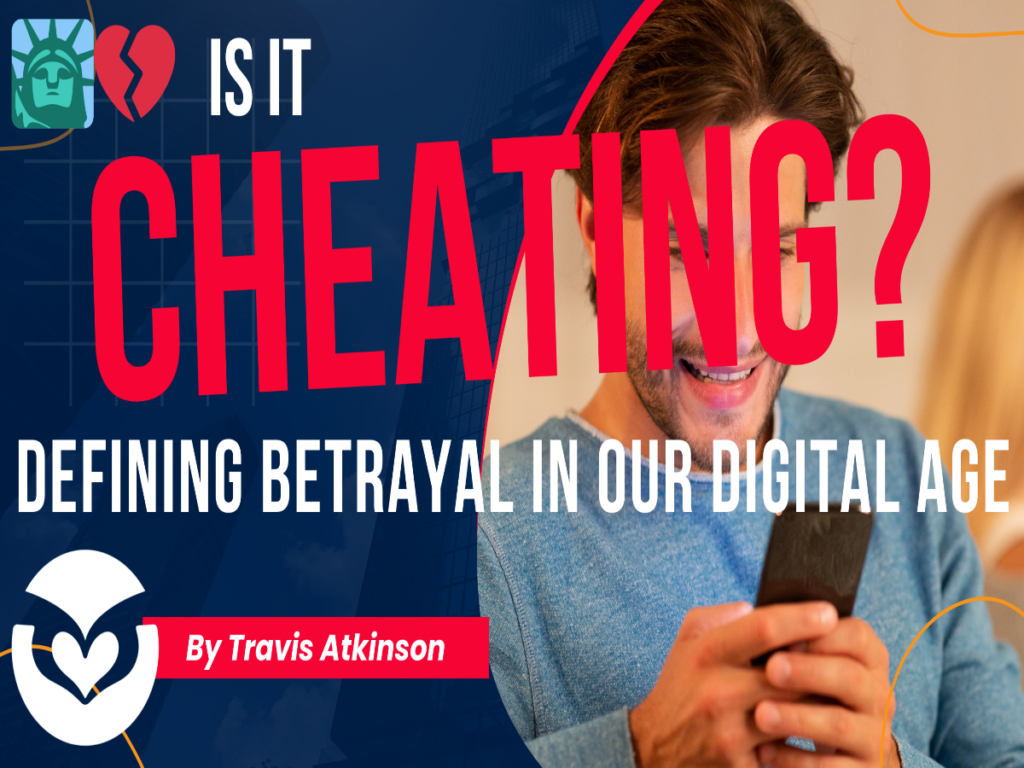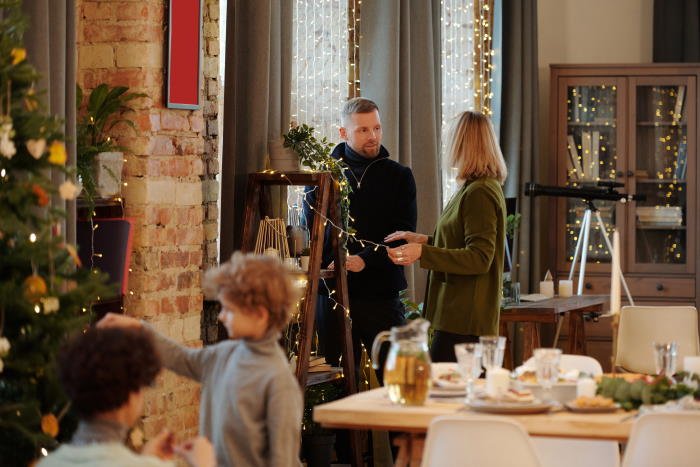Introduction: Navigating Love and Betrayal in the Digital Age
Picture this: Alex is swiping through a dating app late at night while their partner, Jamie, sleeps peacefully beside them. It’s just “innocent fun,” Alex assures themself, as sexual relations aren’t involved. Across the city, Casey is having a deep, emotionally charged conversation with a coworker, feeling a rush they haven’t felt with their spouse in years. The coworker says, “You get me in a way that no one else does.” It’s a digital dance, a keyboard ballet — all done under the veil of pixels and screen light.
Welcome to the intricate maze of modern relationships, where the lines between fidelity and infidelity have blurred into a murky haze. If you find yourself nodding along or even cringing at these scenarios, don’t worry; you’re not alone. Sexual and emotional infidelity are part of a complex landscape that many women and men struggle to navigate.
We’ve shifted from the black-and-white world of romantic candlelit dinners and handwritten love letters to an era where affection can be measured through online infidelity in ‘likes,’ ‘comments,’ and ‘follows.’ Does sliding into someone’s DMs count as cheating? Is having an emotional affair with a “work spouse” the same betrayal as a one-night stand? If these questions keep you up at night, you’re tapping into the pulse of love and betrayal in our tech-savvy society that can lead to relationship dissatisfaction.

You may be wrestling with the uncertainty new technologies bring into your love life in a committed relationship. Maybe you’ve had that sinking feeling when your partner’s phone buzzes late at night, and you can’t help but wonder, ‘Who could that be?’ Let’s be honest: We’ve all been tempted to peek over the digital fence of our relationships, whether it’s snooping through a partner’s texts or diving down the social media rabbit hole. Once a rock-solid foundation, trust seems like quicksand, swallowing our peace and security in its ever-shifting form.
The stakes are sky-high. Sex research, couples therapy, and family therapy studies show us that when infidelity occurs, it’s not just a crack but a seismic shift that shakes the very core of a relationship, sometimes leading to divorce. Infidelity can unleash a tidal wave of emotions—betrayal, loss, and isolation crashing down on both partners. Trust evaporates, replaced by a sticky, unsettling doubt that coats your mind and leaves a bitter taste.
Here’s the rub: Defining infidelity has become more elusive than ever. Gone are the days when a lipstick mark on a collar was the telltale sign of a wandering eye when infidelity occurs. Today’s equivalents are subtler and more insidious, not just for those of a religious faith. For instance, a one-night stand at a conference can be a dealbreaker for some, while others couldn’t care less about a little flirtation. Some couples even operate under a “don’t ask, don’t tell” policy regarding recreational affairs.
How can you and your partner find your way through this labyrinth of love and betrayal? How do you define the boundaries, and how can you rebuild when those boundaries are broken?
Here’s a flashlight for the dark corners of your relationship: Loving at Your Best Marriage and Couples Counseling. We offer a navigational chart through the tangled jungle of infidelity in modern romance, providing insights and tools to help you and your partner find a path to healing. If you’re facing a crisis of trust when infidelity occurs, stumbled with a disloyal act, or even lost your way, there’s no better time to seek help for marital problems of infidelity.
Stick around as we delve deeper into what infidelity means in today’s world, how it impacts relationship health and self esteem, and how you can heal and grow together instead of divorce. Your own health and love life may depend on it.
Intrigued? Let’s sail through the murky waters of modern relationships and infidelity.
Section 1: What is Infidelity? The Definition Dilemma
If infidelity were a chameleon, it would be the master of disguise, capable of taking on multiple forms, colors, and nuances. In days past, it would be a clandestine letter hidden in a drawer or a suspiciously lingering perfume. But today, its face has multiplied with the advent of technology, social media, and an evolving cultural landscape. What used to be easily labeled as “cheating” now hides in the nooks and crannies of digital conversations, Instagram likes, and even platonic work lunches. What is the difference in behavior now with infidelity? What constitutes infidelity in today’s complex romantic ecosystem?
The Dictionary’s Take
Before diving into the emotional quagmire, let’s start with what the dictionary says about infidelity and the difference between disloyalty. According to Oxford, infidelity is the “action or state of being unfaithful to a spouse or other sexual partner.” Sounds simple enough, right? But we all know that it’s far from straightforward. Like quicksilver, it escapes every attempt to pin it down.
This unfaithfulness often feels like a betrayal, a violation of trust, a fracture in the bedrock of your relationship through infidelity. It’s an abandonment, not just physically but emotionally — even spiritually for some men and women who have been cheated when a partner is engaging in infidelities, adultery, and disloyalty.
Emotional Affair: The Invisible Web
Picture Taylor, who has been married to Jesse for 12 years. They share a home, finances, and even Netflix preferences. But Taylor has grown closer to a coworker named Reese. They text all day, share inside jokes, and have long lunches discussing everything but work. There’s no physical intimacy, but the emotional tethering is evident.
To some, it’s a harmless friendship. But for Jesse, it’s an emotional affair — bleeding love and energy that’s supposed to be exclusive to the marital partnership instead of adultery or disloyalty. The damage can be silent but brutal, much like termites slowly eating away at the foundation of a home. The impact can be depression, PTSD, self blame, and even divorce for the husband or wife.

Digital Trysts: The Instagram Mirage
In the palm of your hand, you can access a whole world of possibilities through your smartphone. Remember Alex from our introduction? That swipe on a dating app can quickly become an emotional or sexual connection with another man or woman or multiple people. For some, it’s “just for fun” or a “confidence boost,” but when you’re in a committed relationship, isn’t that a murky territory? Especially when that swipe converts into flirty texts, provocative pictures, or plans to meet for sex. Like quicksand, what seems like an innocent step can pull you into a sexual or emotional world deeper than you intended.
The Influencer Effect: Social Media’s Sway for a Romantic or Sexual Relationship
In our world of influencers and aspirational social media, even a simple double tap can cause sexual concern. Imagine Sam, who follows various models and fitness trainers, frequently leaving flame emojis under their sultry posts. Is that cheating? Or is it just harmless admiration? Here’s the thing: infidelity often isn’t about the act itself but the secrecy and deception accompanying it. When the “like” morphs into a DM and maybe Grindr or Skout, you can potentially head into hazardous sexual or unfaithful terrain with complicated feelings for a husband or wife with another person involved.

Sexuality in the Digital Realm
In the realm of sexting and online erotic exchanges, the sexual boundaries can easily blur further with each act. Sites and apps cater to every fantasy under the sun, providing a playground where emotional and sexual needs can be met without ever leaving your home. For instance, you’re not physically touching someone, so it can’t be cheating, right? Not so fast. Remember, it’s not just about the sex act but also the emotional energy and attention you’re diverting from your primary relationship, engaging with that person instead of your husband or wife, who may need more attention.
The Gridnr/Skout Scenario: Flirting in Bytes and Pixels. What is Sexual Infidelity?
Online platforms have become the new cocktail parties where glances are exchanged and numbers are slipped—except now it’s all in bytes and pixels. Suppose you’re frequently engaging with chat on Gridnr or Skout, trendy social and sex platforms, using them as outlets for sexual or romantic expression. Are you stepping out on your relationship, committing a disloyal act of unfaithfulness?
If your partner, husband, or wife feels betrayed knowing what you’re up to with another person, it’s a red flag — possibly an act of unfaithfulness. It could count as a disloyal act or even infidelity, which can take on many forms and complicated feelings regardless of your personality or gender. Women and men alike can experience infidelity as a painful betrayal and may need couples therapy or family therapy for their infidelity.
In today’s intricate landscape, infidelity wears many masks, even with emotional infidelity linked to another person, sex or not. Whether it’s emotional affairs, digital flirtations, or secretive social media interactions, the definitions are as varied as the people defining them. The thread that weaves these complex patterns of infidelity (and marital infidelity with sex) together violates trust (an act of disloyalty and possibly adultery leading to guilt) and emotional commitment.
Suppose any of the feelings in these scenarios hit too close to home. In that case, it might be time to reassess your boundaries and consider what infidelity means in your relationship. Loving at Your Best Marriage and Couples Counseling can provide a safe space and skilled guidance to navigate these complex issues. Why? Because sometimes love isn’t just about finding a “right enough” person (woman or man) but learning the skills to stay “right enough” with that person.

The Varied Landscapes of Infidelity: From Slip-Ups to Long-Term Affairs
Infidelity has been around as long as relationships have existed, but what we now define as “cheating” or infidelity is a colorful tapestry woven with diverse threads. Infidelity isn’t black and white but a spectrum of grays that can sometimes bleed into each other, making the lines of disloyalty, feelings of sexual or emotional unfaithfulness, and infidelities fuzzy. Let’s delve into the different types of infidelity and behavior stealthily chipping away at relationships when an act of marital infidelity occurs, causing a ripple effect in the lives of couples everywhere.
What Counts as Cheating, Anyway? Sexual Behavior?
Your definition of an act of sexual infidelity or an act of adultery might differ from your partner’s. One person’s “it was just a fling!” can be another person’s ultimate betrayal. An old saying goes, “One person’s trash is another person’s treasure.” Flip it around, and you get: “One person’s innocent fun is another person’s heartache.”
Remember the characters we introduced earlier? They’re not hypotheticals but amalgamations of many couples I’ve worked with engaging in disloyalty and infidelities that have led to fear, anxiety, depression, and sometimes divorce. Being cheated on can cause this fear and anxiety to escalate, with some partners who have been betrayed through an act of disloyalty experiencing PTSD from the betrayal falling victim to the infidelity. If religion is involved, guilt can easily lead to more pain and the possibility of partners shifting to engage toward becoming divorced.
Other reasons in a relationship with dissatisfaction can lead a partner to become victim to a high degree of stress without a healthy ability to cope with the stress. Let’s engage each form of marital infidelity and discuss these couples’ different paths. Becoming divorced for marriages is often not the best answer, as partners can learn from their infidelity and disloyalty, heal from their betrayal with the right ingredients, and engage in expert guidance regardless of their personality.
-
The Classic Affair: The Tango of Deception and Sexual Intimacy
Morgan was an accountant who had a secret relationship with a woman, Casey, a client. This wasn’t a fluke or an accident but a full-blown affair, complete with hotel rooms, sex, and secret rendezvous. Just like a parallel universe, this sex and emotional relationship with another woman completely diverged from the life Morgan shared with their spouse, Jordan. Morgan rationalized their unfaithfulness as a compartmentalization of needs, a way to balance life. But juggling chainsaws might be easier and less damaging.
-
The One-Night Slip-Up: A Misstep or a Milestone?
Then there’s Riley, who, during a business trip, ended up having a one-night stand. Riley returned home to partner Skylar, wracked with guilt. It was a “slip-up,” a “momentary lapse in judgment,” a footnote in the long book of their relationship, according to Riley. But for Skylar, this was not a footnote but a chapter. A chapter that introduced doubt and shattered trust, like a crack in a windshield that you can never unsee.
-
The Work Spouse: Crossing Emotional Lines
As we look at Taylor and Jesse, the emotional affair can sometimes be the most nebulous yet damaging form of infidelity. Jesse felt neglected and replaced by Reese, Taylor’s coworker, leading to a rift that neither saw coming. Over long lunches and endless text chains, Taylor had woven an invisible, yet palpable, wall between them. In some ways, an emotional affair is like an invasive plant. It starts small but can end up choking your entire garden, leaving no room for your primary relationship to grow.
-
The Flirtation: Playing with Fire
Remember Sam, with those curious double taps on Instagram? Sam’s partner, Alex, discovered the messages and the likes. At first glance, they seemed harmless until Alex started connecting the dots. Like connecting constellations in a night sky, a bigger picture emerged that Alex wasn’t comfortable with. When does harmless interaction cross the line into betrayal? It causes your partner emotional discomfort and destabilizes the core trust in your relationship.
The Digital Dilemma: Is the Genie Out of the Bottle
In today’s world, temptation is just a click away. The internet has opened Pandora’s box, offering seemingly infinite opportunities to stray without ever physically “straying.” Whether it’s chat rooms, dating apps, or social media platforms like Grdnr or Skout, the opportunities to stray are not just knocking at your door but flooding your inbox. Sexual fantasies can easily become realities of sexual encounters.
The Apps That Trap
Dating and chatting apps have become the new bar scene. Whether it’s Grdnr, Skout, or other platforms, they have redefined the concept of cheating. You might think you’re just window shopping but could buy more than you bargained for. It’s akin to casually browsing a pet adoption website and ending up with a Great Dane in your one-bedroom apartment—exciting but overwhelming and probably not fair to your current “roommates.”
Infidelity today is as complex as ever, but the consequences remain just as devastating. The stories of Morgan, Riley, Taylor, and Sam are not unique. They are the realities many couples face. Suppose any of these stories resonate with you. In that case, it may signify that your relationship could benefit from expert guidance. Loving at Your Best Marriage and Couples Counseling can help you and your partner find a way back to trust and intimacy.
Are you ready to take the plunge and redefine what fidelity means to you and your relationship?

The Impact of Digital Life and Personal Boundaries on Modern Infidelity
The digital age has ushered in a paradigm shift, creating an alternate world where you can be anyone and do anything. It’s like the Wild West of relationships, where the rules are still being written. How does this affect fidelity, especially when our online actions often blur into our offline sex lives? The topic is as complex as decoding ancient hieroglyphics without a Rosetta Stone. But don’t worry; we’re going to unravel this enigma together.
The Age of Instant Gratification
We live in an era of swipe-left and swipe-right, a digital bazaar of immediate connections. The very nature of these platforms creates an environment where it’s not just easy but downright tempting to explore. In other words, if relationships were puzzles, apps like Grdnr and Skout would have tossed in a few hundred extra pieces. Does this make completing the puzzle impossible? No, but it certainly complicates things.
Instagram and TikTok: Not Just for Influencers
When even your grandma is on Instagram, you know it’s more than just a fad. But you may not realize how these platforms can be a siren song of temptation. The ‘like’ and ‘follow’ buttons are not just affirmations; they can be the first step down a slippery slope. It’s like going to a party where everyone is wearing a mask. You’re drawn to the enigma, the possibility, and before you know it, you’re caught in a web of ‘what-ifs.’
Remember Lee and her husband Chris, a couple I’ve had the privilege of counseling? Chris found out that Lee had been interacting with an ex through TikTok. “It’s just dancing,” Lee argued. But was it? When digital banter replaces physical intimacy or emotional connection, it’s like watering a plastic plant while the real one wilts away.
Navigating the Waters of Virtual Affairs
Is an online relationship considered cheating if it never transcends into the physical world? This gray area is like navigating through a dense fog without a compass. Jamie and Drew, another couple whose story has been anonymized, struggled with this. Jamie found Drew often in sexual conversations on Grdnr, even though they never met anyone in person. Is this a betrayal? Jamie thought so, while Drew felt it was just a digital diversion, like playing a video game. It’s like virtual reality; you can get lost without leaving your living room.

Snooping or Just Double-Checking?
Here’s a situation we’ve all contemplated at least once: Is it okay to check your partner’s phone? It’s like Pandora’s box. Once you open it, there’s no going back. Do you trust what they say, or do you need to see for yourself? The trust issues this creates are like throwing a wrench into the gears of your relationship. Even if you don’t find anything, the act can cause irreparable damage. It’s akin to checking your child’s room for hidden secrets; once done, it changes the dynamics of trust forever.
Betrayal of Trust: The Underlying Theme
The betrayal cuts deep, whether a hidden affair, a one-night stand, or even ‘innocent’ flirting on social media. The common thread runs through every form and instance of infidelity, tearing the fabric of trust and often leaving relationships hanging by a thread.
How We Can Help
When infidelity rears its ugly head, whether it’s a traditional affair or one facilitated by the temptations of the digital age, it’s easy to feel lost and overwhelmed. That’s where Loving at Your Best Marriage and Couples Counseling can step in. We help couples navigate the stormy seas of betrayal, helping you find your bearings when you feel like drowning. Returning to trust is never easy, but it’s far easier to travel with guidance and support.
In this section, we’ve covered a lot of ground, touching on the convolutions of modern marriages and infidelity made intricate by our digital lives. The stories of Lee, Chris, Jamie, and her husband Drew are real; they’re a testament to the complexities of love in the Internet age.
If this article has struck a chord with you, it might be time to take action before the health of your relationship reaches a point of no return. Are you prepared to tackle these challenges head-on?
The Crucial Steps to Salvaging Trust and Love—Before It’s Too Late
We are standing at the crossroads of a complicated journey through the labyrinth of modern love and fidelity. If you’re reading this, you’re not just casually interested but looking for answers. Perhaps your relationship is facing its darkest hour, teetering on the edge of an abyss, like a skyscraper swaying in a hurricane. If so, the moment’s weight is as palpable as a ton of bricks.
Let me tell you, the couples I’ve worked with—like Lee and Chris, Jamie and Drew, whose stories have been modified to protect their privacy—know what it’s like to be at this crossroads. The feeling of having ventured so deep into the forest of doubt and betrayal that you can no longer see the sky. It’s a hopeless place, suffocating and lonely, like being lost in a pitch-black cave with no torch. But here’s the thing—every cave has an exit, every forest has its clearing, and even the darkest night breaks into dawn.
If there’s one universal thing, infidelity scars the relationship and the individuals involved. It’s a Molotov cocktail thrown into the serene lake of trust, disrupting the peace and quiet with ripples that are felt long after the event has passed. The betrayed often asks, “Could I have done something differently?” while the unfaithful may think, “Is there a way to undo what I’ve done?” Unfortunately, the past is like a written chapter, but the future is still blank. And there is always time to write a new story.
You don’t have to navigate this treacherous landscape alone. At Loving at Your Best Marriage and Couples Counseling, we understand the complexities of modern relationships, the unique challenges brought about by the digital age, and the timeless wounds inflicted by infidelity. We can offer you the tools to rebuild, the strategies to heal, and most importantly, the compassionate, non-judgmental space to find your way back to each other. Because even if trust is broken, it can be rebuilt, just like a shattered vase can be put back together to form something uniquely beautiful—a testament to resilience and the enduring power of love.
Don’t let your relationship become another tragic love story gathering dust on the bookshelf of life’s missed opportunities. Act now, before it’s too late. Trust me, restoration is easier and faster if you can catch a leaking roof before it becomes a flood. So take that crucial step today; reach out for professional guidance.
If any of this resonates with you, I urge you, don’t let another day go by. Keep your love story from becoming an anthology of ‘what-ifs’ and ‘if-onlys.’ Schedule an appointment with us at Loving at Your Best Marriage and Couples Counseling. The help you need is just a phone call or a click away.
What are you waiting for? Let’s turn the page and start writing the next chapter of your love story. Because everyone deserves a happily ever after.
Author
-
Travis Atkinson, L.C.S.W., is the Director and Creator of the Loving at Your Best Plan. He has extensive training in marriage and couples therapy, based on over 27 years in practice, earning certificates from top-rated couples therapy models, including: *Certified Advanced Schema Therapist, Supervisor and Trainer for Individuals and Couples *Certified Emotionally Focused Couples Therapist and Supervisor *Certified Gottman Method Couples Therapist *Certified Group Psychotherapist *Honorary Lifetime Member of the International Society of Schema Therapy Travis is a co-author of the latest schema mode therapy inventory, the SMI. He is also the co-author of two chapters in the recently published “Creative Methods in Schema Therapy: Advances and Innovation in Clinical Practice (Routledge, 2020) and author of “Schema Therapy for Couples: Healing Partners in a Relationship” in the Handbook of Schema Therapy (Wiley-Blackwell, 2012).
View all posts

































































